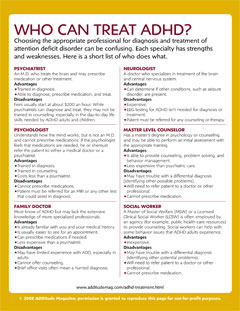I completed my training in General Psychiatry, followed by training in Child and Adolescent Psychiatry, in the mid-1960s. My medical specialty was a relatively new sub-specialty of psychiatry. At that time, the theory for understanding and treating children was centered in psycho-analytic theory and psychoanalytically-oriented psychotherapy. All of my training and clinical supervision was based on this model. I was fascinated by the psychology of the mind. But I was equally interested in understanding brain function, and the relationship between the brain and the mind.
With the permission of the director of my training program, I attended case conferences for the residents in another new medical sub-specialty, Child Neurology. One boy there had something called "Hyperkinetic Reaction of Childhood." It's now called Attention Deficit Hyperactivity Disorder, or ADHD. The child was hyperactive and doing poorly in school. He was placed on medication (dextro-amphetamine), and his symptoms improved.
I was working with a child with similar symptoms in therapy. He showed all of the characteristics of Hyperkinetic Reaction of Childhood. I discussed my idea of trying medication. My supervisor was not happy with the idea of using medication instead of psychotherapy, and encouraged me to concentrate on "the psycho-dynamics of the case." I was frustrated with the lack of progress, so I took the risk of getting into trouble. In collaboration with my patient's pediatrician, I arranged for him to start taking dextro-amphetamine. His parents, his teacher, and my patient noted a dramatic improvement. He was able to sit in class and to concentrate on his work. His disruptive behaviors stopped. I could not explain to my supervisor that I had ignored his directions and arranged for medication to be used. So, I had to stress how the psychotherapy and parent guidance resulted in the improved behaviors. My supervisor praised my work.
How Things Changed
Child and Adolescent Psychiatry has come a long way since then. We use a bio-psycho-social model that takes into account brain function, as well as psychological and social function — all in the context of the child's life within the family, at school, and with peers. Studies of children with ADHD taught us about the relationship between brain function, or dysfunction, and the observed clinical behaviors.
Many believe that ADHD was the first disorder shown to be the result of a deficiency in the production of a specific neurotransmitter in specific areas of the brain. The discovery that a group of medications — called "stimulants" because they stimulated specific nerve cells to produce more of this deficient neurotransmitter — caused a decrease in, or stopped, the observed hyperactivity, inattention, and/or impulsivity opened up the field of child psycho-pharmacology.
Today, we know of other disorders that are the result of a deficiency of specific neurotransmitters in specific areas of the brain. (To date, we have not found a disorder that appears to be the result of too much of a specific neurotransmitter being produced in specific areas of the brain.) For each of these disorders, we have medications that increase the production of the neurotransmitter, leading to improvement. It was studies of individuals with ADHD that expanded our knowledge of neuroscience and the treatment for neurologically based disorders.
Next: Lessons Learned






